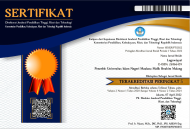Al-Qolaq ‘Inda Mahaarah al-Qiraa’ah lada Thalabah al-Ma’had al-Ulya bi al-Madrasah al-Tsaanawiyyah al-Islaamiyyah al-Hukuumiyyah Batu min Mandzuur Nadzariyyah Sigmund Freud
Abstract
Reading skills are one of the important skills that must be possessed by an individual to be skilled in the language. Because language skills have implications for an individual's ability to compete in the international arena in the aspects of scientific communication, economic transactions, and global negotiations. However, in realizing reading skills in an individual, anxiety is found as a problem that has the potential to hinder and complicate it. This paper aims to: 1) Describe the Arabic reading skills of students in Ma'had Al Ulya; 2) Describe the anxiety experienced by students in Ma'had Al Ulya about Arabic reading skills based on Sigmund Freud's perspective. The method used is a descriptive qualitative research method with a case study design. Sources of data in this study were students in Ma'had Al Ulya who experienced anxiety in Arabic reading skills. The researcher as a research instrument uses data collection techniques through observation, interviews, and documentation as well as Miles and Huberman's descriptive analysis techniques. The results showed that: 1) The reading skills of students in Ma'had Al Ulya are the initial reading skills, where an individual can be literate in Arabic reading but has not yet reached the ability to understand the content of the reading (discourse literacy); 2) Anxiety was found in the initial reading skills by students in Ma'had Al Ulya which included reality anxiety, neurotic anxiety and moral anxiety towards Arabic reading. This anxiety is classified by Sigmund Freud as a condition of one's feelings related to concern, anxiety, uncertainty, or fear of facing reality.
Keywords
Full Text:
PDFReferences
Aprizal, A. P. (2021). Urgensi Pembelajaran Bahasa Arab dalam Pendidikan Islam. Jurnal Pendidikan Guru, 2(2), 87–93.
Budiman, M. (2015). Kecemasan Berbahasa Asing (Bahasa Arab). Lensa: Kajian Kebahasaan, Kesusastraan, Dan Budaya, 5(2), 109–131.
Cahyani, R. D., Elmustian, & Burhanuddin, D. (2018). ANXIETY FIGURES ICIH PRIHATINI IN THE SCRIPT OF MONOLOGUE DRAMA WANCI WORKS FROM IMAS SOBARIAH : PSYCHOLOGICAL ANALYSIS OF LITERATURE. Jurnal Online Mahasiswa Fakultas Keguruan Dan Ilmu Pendidikan Universitas Riau, 5(1), 1–13. https://www.neliti.com/publications/202464/kecemasan-tokoh-icih-prihatini-dalam-naskah-drama-monolog-wanci-karya-imas-sobar
Hasan, A. W., & Hilmi, D. (2022). Manajemen Pelaksanaan Program Pembelajaran Bahasa Arab Di Pondok Pesantren Sunan Kalijogo Surabaya. Tarbiyatuna: Jurnal Pendidikan Ilmiah, 7(1), 75–90. https://doi.org/10.55187/tarjpi.v7i1.4602
Undang-Undang Republik Indonesia Nomor 20 Tahun 2003 tentang Sistem Pendidikan Nasional, 39. https://doi.org/10.24967/ekombis.v2i1.48
Kamus Besar Bahasa Indonesia. (n.d.).
Muhammad. (2011). METODE PENELITIAN BAHASA. AR-RUZZ MEDIA.
Muhammad Yassir. (2014). Hakikat Keterampilan Berbahasa (TR RESUME 1). Academia.
Muhsyanur. (2014). MEMBACA (Sebagai Suatu Ketrampilan Berbahasa Reseptif). BUGINISE ART. https://www.google.co.id/books/edition/MEMBACA/YqXpDwAAQBAJ?hl=id&gbpv=1&dq=membaca+sebagai+suatu+keterampilan+berbahasa&printsec=frontcover
Nandang Sarip Hidayat. (2012). Problematika Pembelajaran Bahasa Arab. Jurnal Naskhi: Jurnal Kajian Pendidikan Dan Bahasa Arab, 37(1), 40–58. https://doi.org/10.47435/naskhi.v2i1.290
Nur Toifah. (2019). Integrasi Pendidikan Karakter dalam Pembelajaran Ketrampilan Membaca Arab. Lugawiyyat, 1(1), 49–68.
Olivia, H. M., & Anggraeni, R. D. (2020). Psikologi Sastra Sigmund Freud. In Pemahaman Perkembangan Teori Sastra. Lakeisha.
pascapbi2. (2012). BEBERAPA ALASAN MENGAPA BAHASA INGGRIS MENJADI BAHASA INTERNATIONAL. Pascapbi.Uad.Ac.Id. https://pascapbi.uad.ac.id/beberapa-alasan-mengapa-bahasa-inggris-menjadi-bahasa-international/
Rasyidi, Z. Z. (2020). Al-Ta’rib. Jurnal Ilmiah Program Studi Pendidikan Bahasa Arab IAIN Palangka Raya, 8(1), 103–116.
Sholeha, F. Z., & Baqi, S. Al. (2022). KECEMASAN PESERTA DIDIK DALAM PEMBELAJARAN BAHASA ARAB. MAHIRA : Journal of Arabic Studies, 2(1), 1–12.
Sugiyono. (2020). METODE PENELITIAN KUALITATIF. Alfabeta.
DOI: https://doi.org/10.18860/lg.v5i1.20168
Refbacks
- There are currently no refbacks.
Indexed By ;
--------------------------------------------------------------------------------------------------------------------------------------------------------------------------------------
Program Khusus Pengembangan Bahasa Arab
Gedung C (Prof. Dr. H. Mudjia Rahardjo., M.Si.) Lt. 1
Jl. Gajayana No 50 Kota Malang, Jawa Timur, Indonesia, Kode Pos 65144,

Lugawiyyat Journal is licensed under a Creative Commons Attribution-ShareAlike 4.0 International License .






